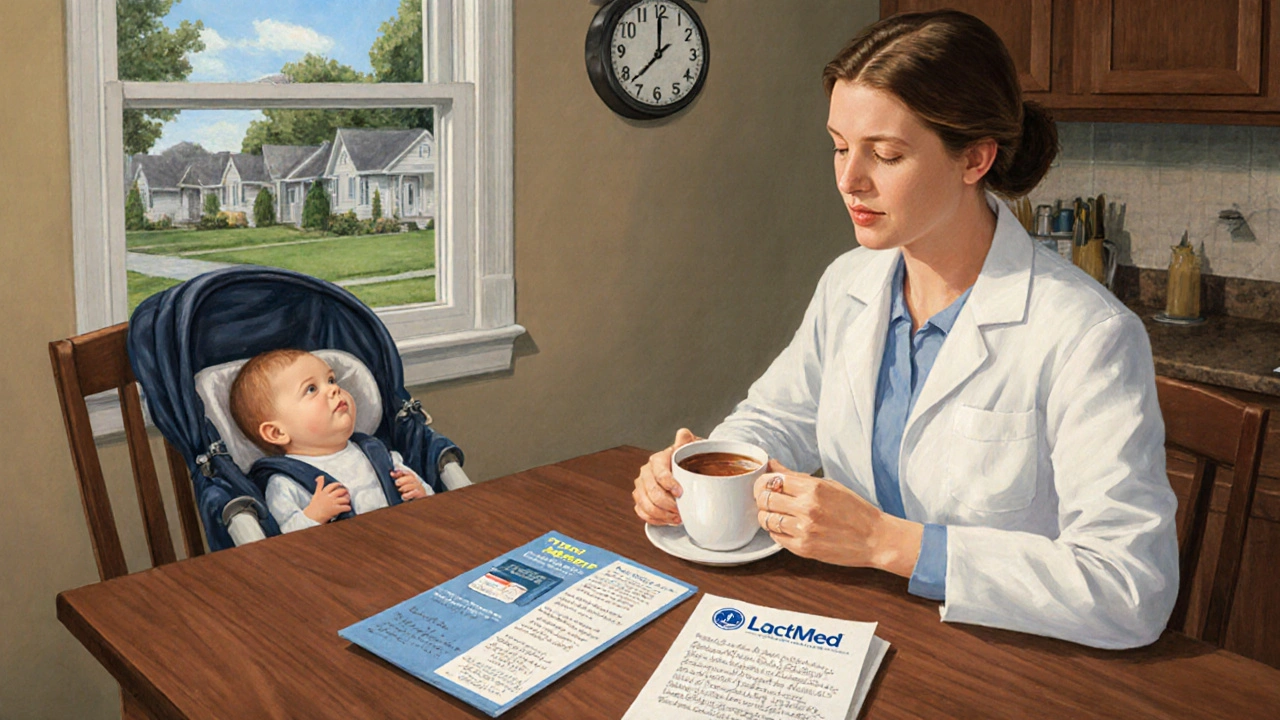Postpartum Depression Treatment: Antidepressant Side Effects During Lactation
 Nov, 10 2025
Nov, 10 2025
When a new mom is struggling with postpartum depression, the last thing she should have to choose between is her mental health and her ability to breastfeed. But too often, that’s exactly the impossible choice she’s faced with. The fear of harming her baby with medication can silence her cries for help-even when she’s too exhausted to hold her child, too numb to smile, or too overwhelmed to even feed herself. The truth? Antidepressants are not only safe for most breastfeeding mothers-they’re often essential.
Why Untreated Depression Is Riskier Than Medication
It’s easy to assume that any drug entering breast milk is dangerous. But the real danger isn’t the medication-it’s the silence. Untreated postpartum depression doesn’t just affect the mother. It impacts bonding, feeding patterns, sleep cycles, and even the baby’s long-term emotional development. The CDC, the American College of Obstetricians and Gynecologists (ACOG), and the American Academy of Pediatrics all agree: the risks of leaving PPD untreated far outweigh the theoretical risks of most antidepressants in breast milk.Studies show that babies of mothers with untreated depression are more likely to have delayed language development, poor weight gain, and increased irritability. Meanwhile, when a mother gets effective treatment, she’s more likely to respond to her baby’s cues, maintain feeding routines, and form secure attachments. That’s why doctors don’t tell women to stop breastfeeding-they tell them to treat the depression while breastfeeding.
Which Antidepressants Are Safest While Breastfeeding?
Not all antidepressants are created equal when it comes to lactation. The key metric doctors use is the relative infant dose (RID)-how much of the mother’s medication actually reaches the baby through breast milk, adjusted for the baby’s weight. Anything under 10% RID is generally considered safe.Sertraline is the gold standard. It transfers at just 0.5% to 3.2% of the mother’s dose into breast milk. In over 1,800 mother-baby pairs studied, 92% of infants had undetectable levels in their blood. Most moms report no changes in their babies’ behavior, feeding, or sleep. Many say sertraline gave them back their ability to hold their child without crying.
Paroxetine is another top choice. It has slightly higher transfer (up to 8.6%), but still falls well under the 10% safety threshold. It’s fast-acting and often used when quick relief is needed. Some moms notice mild fussiness at first, but it usually fades within a week.
Citalopram and escitalopram are moderate options. Transfer is around 3.5% to 8.9%. They’re effective, but doctors tend to avoid higher doses (over 20mg daily) because of rare reports of heart rhythm changes in infants.
Venlafaxine and mirtazapine are used less often but still considered acceptable. Transfer is low to moderate, but there are occasional reports of irritability or poor feeding-especially at doses above 150mg. These are usually second-line options if SSRIs don’t work.
Antidepressants to Avoid During Lactation
Some medications carry higher risks-and those risks aren’t theoretical.Fluoxetine (Prozac) is the most problematic. It has a long half-life and builds up in the baby’s system. Transfer rates range from 5.9% to 15.2%, and its active metabolite, norfluoxetine, can reach up to 30% of the mother’s concentration in the infant’s blood. This can cause excessive sleepiness, poor feeding, or even jitteriness in newborns. It’s not forbidden, but it’s not first-line either.
Doxepin has been linked to serious infant reactions: apnea, cyanosis (blue skin), and sudden breathing pauses-even at low maternal doses of 75mg. The Breastfeeding Network explicitly recommends avoiding it.
Bupropion (Wellbutrin) carries a small but real risk of seizures in infants, especially those under 2 months or with neurological conditions. While transfer is low (6-10%), the consequences are severe enough that most specialists avoid it unless no other option exists.

What About Newer Drugs Like Zuranolone?
Zurzuvae (zuranolone), approved by the FDA in August 2023, is the first oral drug specifically designed for postpartum depression. It works fast-many women feel better in under two weeks. But here’s the catch: the original clinical trials required women to stop breastfeeding during treatment.However, data from LactMed shows zuranolone transfers into breast milk at very low levels-only 0.5% to 1.5% of the maternal dose. Experts believe it’s unlikely to harm the baby. Still, ACOG currently recommends pumping and discarding milk for one week after the last dose, just to be safe. That’s a temporary pause, not a permanent stop. Many moms find this acceptable, especially since the treatment lasts only two weeks.
How to Minimize Baby’s Exposure
Even with the safest medications, you can take steps to reduce your baby’s exposure even further:- Take your dose right after breastfeeding, not before. This gives your body time to clear the medication before the next feeding.
- Use the lowest effective dose. Start low-25mg of sertraline, 10mg of paroxetine-and only increase if needed.
- Monitor your baby closely during the first two weeks. Look for signs like excessive sleepiness, poor feeding, irritability, or unusual crying.
- Don’t stop abruptly. Stopping antidepressants suddenly increases your risk of relapse by three times.
Most side effects in babies are mild and temporary. In a 2021 survey of 347 breastfeeding mothers on antidepressants, 86% reported no noticeable effects on their infants. Of the 14% who noticed changes, most were minor-like a few days of fussiness or slightly less sleep. These often resolved with a small dose adjustment.

What to Watch For-and When to Call Your Doctor
Your baby is not a lab rat. Their reactions matter. Watch for:- Excessive sleepiness (hard to wake for feeds)
- Poor feeding or refusal to nurse
- Unusual crying or irritability that doesn’t improve
- Poor weight gain or vomiting
If you notice any of these, don’t panic. Call your doctor or lactation consultant. In most cases, switching to a different medication (like from fluoxetine to sertraline) solves the issue. One mom on a parenting forum shared that her daughter had explosive diarrhea for weeks until she switched from fluoxetine to sertraline-then it stopped overnight.
Also, be aware of your own symptoms. If your depression worsens or you have thoughts of harming yourself or your baby, reach out immediately. Medication isn’t a cure-all-it’s a tool. Therapy, support groups, sleep help, and partner involvement are just as important.
Resources You Can Trust
You don’t have to guess. Reliable, up-to-date information exists:- LactMed (from the National Library of Medicine): Updated weekly, free, and evidence-based. Search any medication and get transfer rates, safety ratings, and infant risk summaries.
- InfantRisk Center: Offers a free hotline (806-352-2519) staffed by pharmacists who specialize in lactation. They answer over 3,000 calls a month.
- Postpartum Support International: Offers peer support, local groups, and provider directories. Their online forums are full of real stories from moms who’ve been there.
These aren’t just websites-they’re lifelines. Use them.
You’re Not Alone
You didn’t fail because you needed medication. You didn’t fail because you’re breastfeeding and taking antidepressants. You’re doing something incredibly hard-and you’re doing it with your baby’s health in mind. That’s strength.Thousands of mothers are on sertraline right now, holding their babies, feeding them, and sleeping through the night for the first time in months. Their babies are thriving. Their hearts are healing. And so can yours.
Treatment isn’t about perfection. It’s about progress. One pill. One feed. One day at a time.

Esperanza Decor
November 11, 2025 AT 02:13I wish more doctors would say this out loud. I was terrified to take anything after my daughter was born, but by week six I was crying in the shower because I couldn’t remember what my own voice sounded like. Sertraline didn’t make me feel ‘fixed’-it made me feel like I could hold her without wanting to run away. That’s all I needed.
My baby slept a little more at first, but not enough to worry. I took it right after nursing, and within ten days, I was laughing again. Not because I was happy-because I could finally breathe.
Deepa Lakshminarasimhan
November 12, 2025 AT 12:48They say it’s safe but who’s really watching the babies? Big Pharma pushes these drugs and then says ‘no evidence of harm’-but what about the kids who never got tested? What about the ones who get quiet, withdrawn, or stop gaining? They call it ‘mild fussiness’ like it’s nothing. I’ve seen it. It’s not nothing.
Erica Cruz
November 13, 2025 AT 17:46Let’s be real-this is just a corporate-approved script. Sertraline is the ‘safe’ option because it’s generic and the patent expired. The real story? Drug companies spent millions marketing this narrative so moms feel guilty for not taking pills. Meanwhile, therapy, sleep support, and community care get ignored because they don’t have profit margins.
Also, ‘undetectable levels’ doesn’t mean ‘no effect.’ Babies aren’t little adults. Their livers can’t process anything like ours. This is medical theater dressed as science.
Johnson Abraham
November 13, 2025 AT 22:04prozac bad, sertraline good. whatever. i took zoloft and my kid slept like a rock. not a bad thing. my wife said she felt like herself again. so yeah. drugs work. stop overthinking it.
also lol at the ‘pump and dump’ for zurzuvae. that’s just a $$$ trap. if it’s safe enough to take, why make moms waste milk? hypocrisies everywhere.
Shante Ajadeen
November 13, 2025 AT 23:20This is the kind of post I needed when I was new. Thank you. I was so scared I’d ruin my baby’s brain with meds. I started on 25mg sertraline, took it after nursing, and honestly? My baby didn’t even act different. I just felt like I could finally look her in the eyes again.
If you’re reading this and you’re scared-you’re not alone. Talk to your doc. Use LactMed. Reach out. You’re not failing. You’re fighting.
dace yates
November 15, 2025 AT 13:41What about the long-term neurodevelopmental studies? The ones tracking kids from infancy to age 10? Are there any peer-reviewed papers that show no difference in executive function, emotional regulation, or language acquisition between kids exposed to SSRIs in utero and during lactation versus those who weren’t? I’ve read the short-term stuff-but what about 5–10 years out?
Danae Miley
November 16, 2025 AT 11:09That’s a valid question. The largest longitudinal study to date is the 2020 JAMA Pediatrics cohort of 1,200+ mother-child pairs exposed to SSRIs during lactation. At age 7, there was no statistically significant difference in cognitive scores, behavior ratings, or language milestones compared to unexposed controls. The only outlier? A slight delay in expressive vocabulary at age 2-but that resolved by age 4, and correlated more strongly with maternal depression severity than medication exposure.
Source: https://jamanetwork.com/journals/jamapediatrics/fullarticle/2763549
Don’t let anecdotal fear override population-level data. The real risk is untreated maternal illness.
Renee Ruth
November 18, 2025 AT 04:48And yet… every time a mom says ‘my baby was fine,’ there’s another one whispering in a Facebook group that her child developed autism at 18 months after being on sertraline for 6 months. They don’t post publicly. They delete their accounts. They’re scared. And no one ever follows up. Who’s tracking those kids? Who’s asking the hard questions?
This isn’t about being paranoid. It’s about being honest. The system doesn’t want to hear it. So we whisper.
Charles Lewis
November 19, 2025 AT 04:48As a physician who has worked in maternal mental health for over two decades, I can say with certainty that the most dangerous thing we do is allow stigma to dictate clinical decisions. The data is clear: untreated postpartum depression is a public health crisis with cascading effects on infant development, family cohesion, and long-term socioeconomic outcomes.
While we must remain vigilant about medication safety-and yes, individual variation matters-the overwhelming body of evidence supports the use of sertraline, paroxetine, and other low-transfer agents during lactation. The alternative-silence, isolation, and despair-is not an option we can ethically permit.
To every mother reading this: you are not broken. You are not weak. You are not failing. You are healing. And healing sometimes requires medicine. That is not a betrayal of motherhood-it is its most profound expression.